Admin
Full List: 3,690 Nigerians, Other Countries Face Deportation From US
Approximately 3,690 Nigerians are among those facing deportation as President Donald Trump intensifies efforts against illegal immigration in the United States.
A document from the US Immigration and Customs Enforcement (ICE), obtained by The PUNCH on Tuesday, details the nationalities and numbers of individuals under ICE’s “non-detained docket” with final removal orders.
The report states that, as of November 24, 2024, over 1.4 million non-citizens have been flagged for deportation.
Deportation Breakdown
The document, titled “Noncitizens on the ICE Non-Detained Docket with Final Orders of Removal by Country of Citizenship”, shows Mexico and El Salvador leading the list with 252,044 and 203,822 deportees, respectively. Nigerians account for 3,690 individuals in the category.
ICE, tasked with safeguarding national security by tackling cross-border crimes and illegal immigration, has ramped up deportation operations. Trump’s renewed immigration policies have heightened fears among Nigerians and other African nationals illegally residing in the US.
Mass Deportation Operations Begin
Last Thursday, hundreds of migrants were detained, and others were deported via military aircraft as part of Trump’s mass deportation initiative.
On his inauguration day as the 47th President, Trump signed several executive orders tightening immigration laws, including ending birthright citizenship for children of undocumented immigrants.
He also declared a national emergency at the southern border, deploying additional troops and threatening to expel “criminal aliens.”
Tensions with Colombia Resolved
Trump’s deportation plan faced pushback from Colombia’s President Gustavo Petro, who initially blocked US military aircraft carrying deportees.
In response, Trump announced tariffs and sanctions against Colombia, threatening to increase tariffs to 50% within a week and impose financial and visa restrictions.
By Sunday night, the standoff ended after Colombia agreed to accept deportation flights. Petro’s government released a statement affirming that deportees would be received under “dignified conditions.”
The White House acknowledged the agreement, noting that tariffs and sanctions were “held in reserve,” pending compliance.
See the full deportation list below:
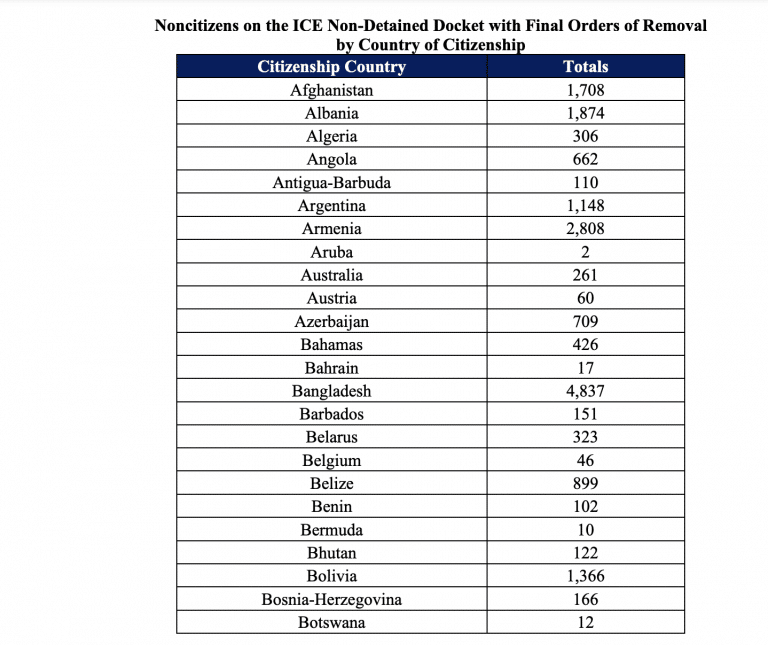
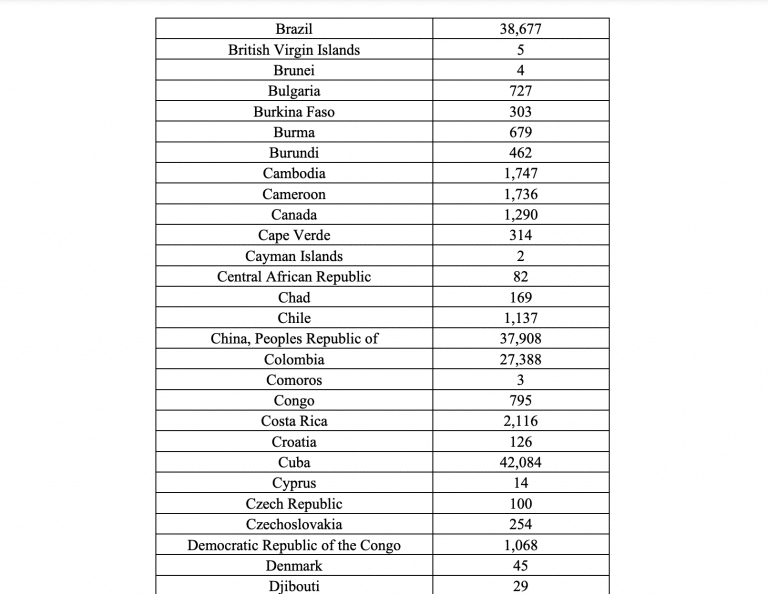
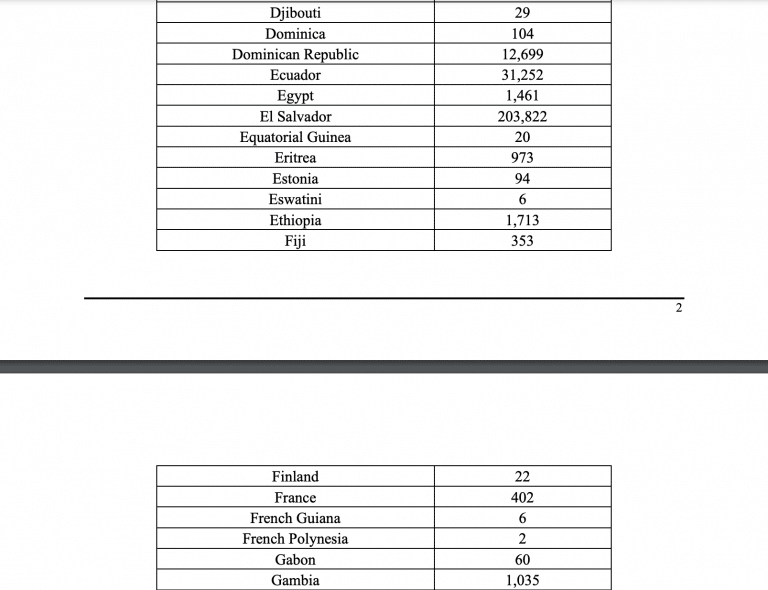
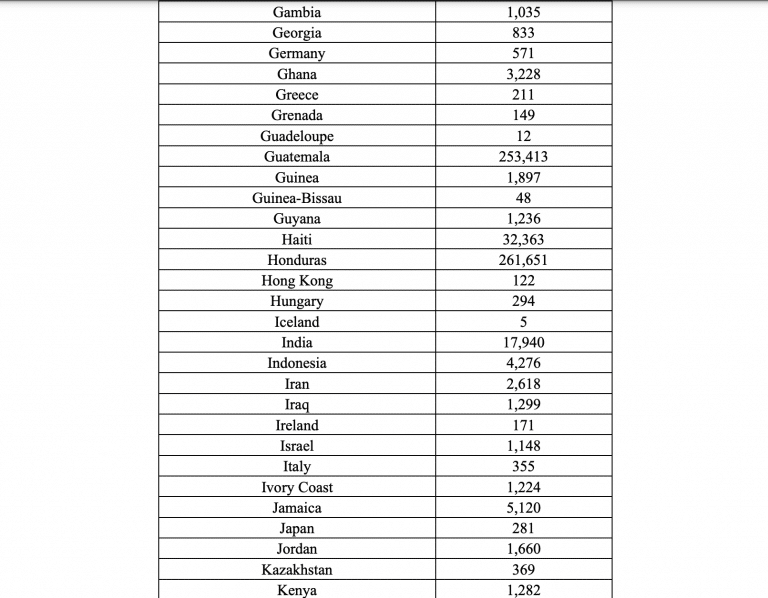
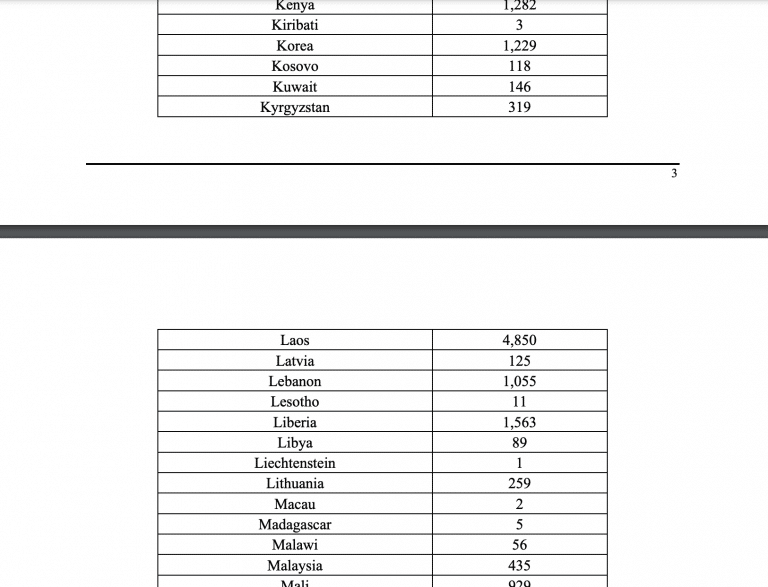
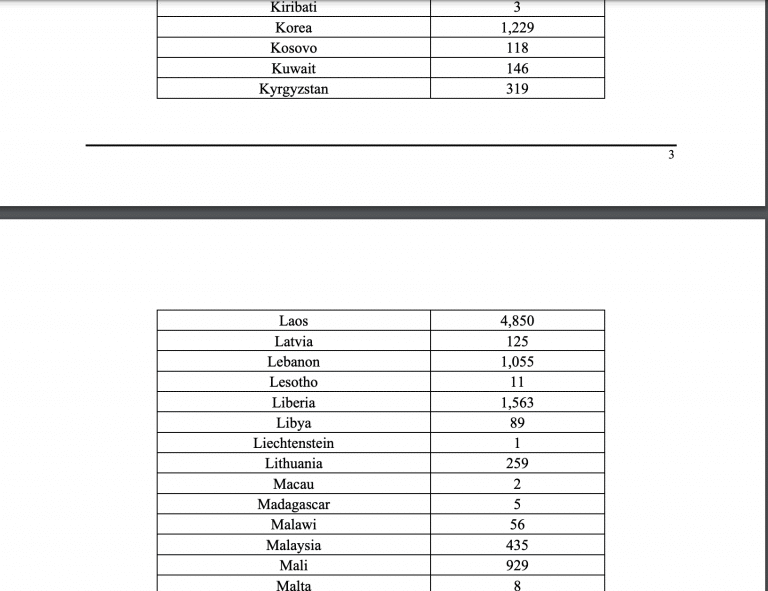
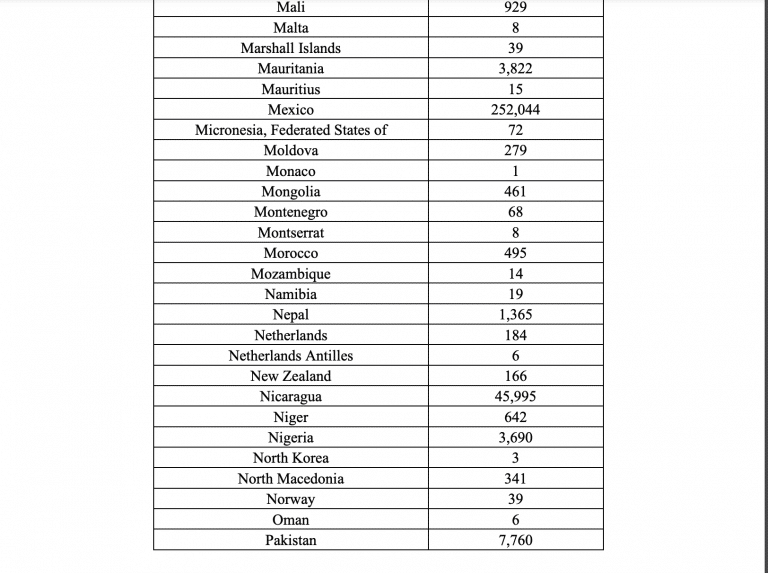
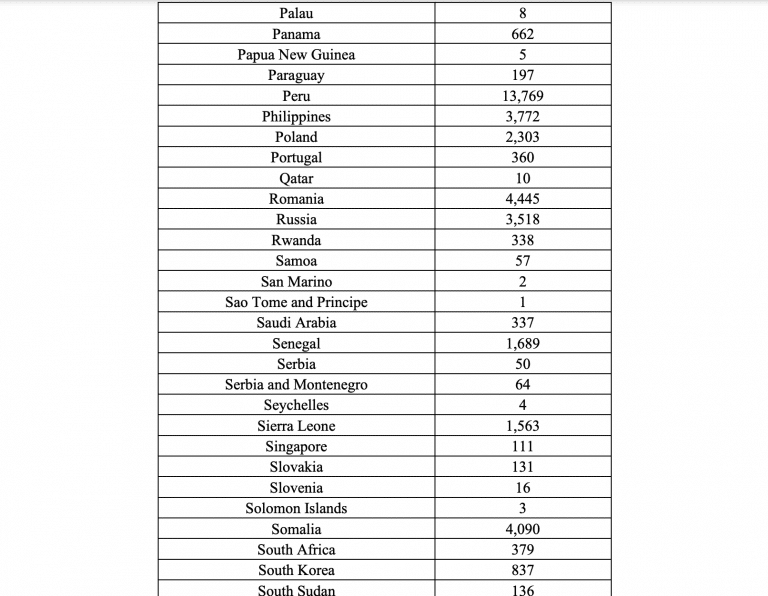
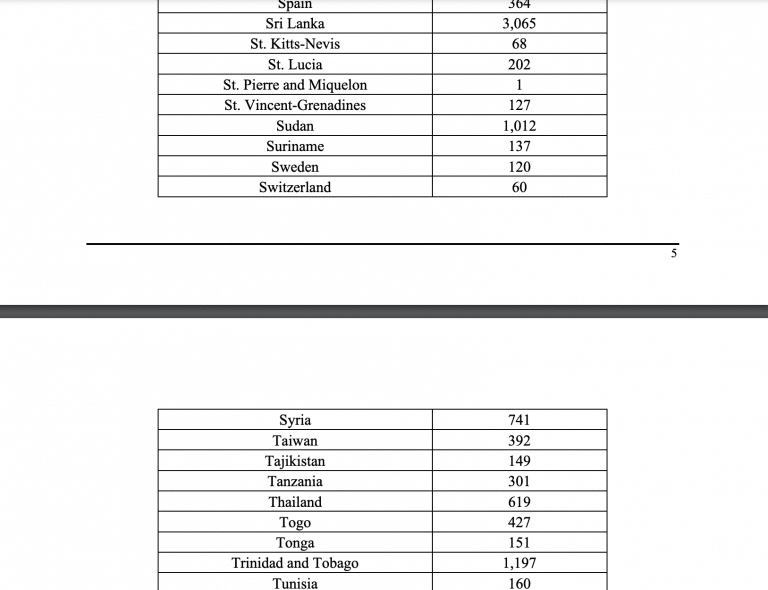
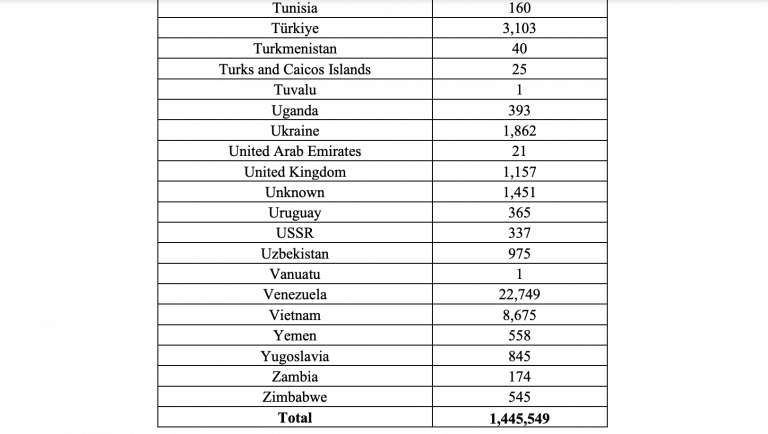
Gov Mbah, Wabara Others Shun Meeting Endorsing Anyanwu As PDP Scribe
Keeping to their resolve, Peoples Democratic Party (PDP) leaders from the South East, including Enugu State Governor, Peter Mbah; Board of Trustees Chairman, Adolphus Wabara; Senator Austin Akobundu on Tuesday shunned the meeting of PDP stakeholders held at the party’s national secretariat in Abuja.
This is as the South East stakeholders who met in Abuja passed a vote of confidence on Sen. Samuel Anyanwu, as national secretary of the party.
The South East stakeholders however warned that the lingering crisis over the position of the party’s national secretary could make the party suffer and lose the 2027 election.
PDP leaders from the region had, in a statement by its national vice chairman, Chief Ali Odefa, distanced themselves from yesterday’s meeting, having endorsed Sunday Ude-Okoye as national secretary at a meeting held last Friday in Enugu.
However, the Abuja meeting was presided over by Anyanwu and was attended by Chris Ubah. Anyanwu said there was no basis for disagreement since the party is awaiting the decision of the Supreme Court on the position of the national secretary.
He said the meeting was called by South East members of the PDP NWC and not the national leadership.
Anyanwu blamed Odefa for instigating political mischief, claiming that the vice chairman had been expelled from PDP and was not in a position to convene any PDP meeting.
Explaining the genesis of his crisis, Anyanwu said, “In October, the former National Vice Chairman South East, Chief Ali Odefa went and connived with some people to remove me as the National Secretary.
“He went and convinced the governor of Enugu that our constitution says that I will resign for me to run because he knows that his tenure as National Vice Chairman is coming to an end, so he wanted to perpetuate himself in office. So he sold this idea to the governor of Enugu state, His Excellency Peter Mbah whom I met and told him that it is wrong.
“He went and printed fake electoral guidelines for primary election and took it to his excellency and he bought into it without knowing the truth. Based on that, they now came and told me that I should resign.
“On the 10th of November while I was busy preparing for my election, they went and got from a state high court in Enugu and based on this fake document, the judge gave an order that I am supposed to have resigned. They told me that someone else has been appointed, one Ude-Okoye has been appointed as National Secretary of the party.
“I was elected through a national convention and it is only through convention that I can be removed.
“They went ahead and told the governor because he is the only governor from the South East that if I become a governor, as former National Secretary of the party, that I will be too powerful and that it is better for him to continue to become the only governor from the South East.
“On the 9th of January 2025, Federal High Court Abuja gave a judgement and it was quite explicit that that I remain the national secretary of this party until 9th of December, 2025 when my tenure will elapse.”
Reading the communique of the South East stakeholders, after the meeting that last for several hours, the South East Legal Adviser of PDP, Ukpai Ukairo, said that the South East leaders have passed a vote of confidence on Anyanwu.
He added that Ali Odefa is no longer a member of the Peoples Democratic Party and should not be found in the circle of any official role within PDP.
Accordingly, “he should not have any role or play any part in any form or manner with concerning the affairs of the PDP.
By Article 27(3) of the Constitution of the Peoples Democratic Party the Zonal Executive Committee can only be summoned at the instance of the National Vice Chairman. In consideration of the fact that there is no National Vice Chairman in office the Zonal Executive Committee Meeting of the South East fixed for the 24th January, 2025 cannot be a lawful meeting of the organ of the party.
“Arising from the foretasted legal opinion, the members of the Zonal Working Committee (ZWC) from Abia, Imo and Anambra States and several statutory members of the Zonal Working Committee ignored the notice of meeting and consequently boycotted the meeting.”
[Leadership]
Confab: How To Make 2027 Polls Credible, Acceptable
Ahead of the 2027 General Elections, various stakeholders, including opposition parties, civil society organisations (CSOs), security agencies, and media, have been urged to strengthen their roles to ensure Nigeria’s democracy thrives.
This call was made at the National Conference on Strengthening Democracy in Nigeria, which held in Abuja on Monday and Tuesday.
The conference, themed “Strengthening Nigeria’s Democracy: Pathways to Good Governance and Political Integrity,” featured Mr. Mahamudu Bawumia, the immediate past Vice President of Ghana, as the keynote speaker. It was organised by the African Centre for Leadership, Strategy, and Development (Centre LSD), Centre for Democracy and Development (CDD), Westminster for Democracy (WfD), Peering Advocacy and Advancement Centre in Africa (PAACA), and the National Peace Committee (NPC).
The communiqué presented by Dr. Otive Igbuzor, Mrs. Abiola Akiyode-Afolabi, and Ezenwa Nwagwu stressed the need for strengthening Nigeria’s democratic foundations.
“While Nigeria has maintained uninterrupted democratic governance for over 25 years, it faces an unprecedented crisis that threatens its survival,” the communiqué noted.
It said that despite holding seven general elections since return to democracy in 1999, systemic issues like electoral malpractice, political party inefficiency, weak governance, and corruption have eroded public trust.
Key issues raised during the conference included the increasing threats to democracy in Africa, exemplified by eight coups between 2020 and 2023, and the attempts of certain leaders to alter constitutions to extend their tenure.
The communiqué also highlighted alarming findings from the 2023 Open Society Barometer, which revealed that 30% of Nigerian youth believe military rule could be better for citizens.
Participants noted the weakening of state institutions by overbearing executive leaders and the rise of state and elite capture, which threatens the pluralistic nature of Nigeria’s democracy. “There is a growing tendency for electoral outcomes to be decided by the judiciary rather than through the ballot,” the communiqué warned.
Further concerns were raised about the rise in vote-buying, despite ongoing reforms meant to sanitise the electoral system. The erosion of political parties’ roles due to their capture by “barons and warlords”, resulting in a lack of internal democracy, was also discussed. Additionally, the centralisation of the electoral management system and the absence of opposition voices and civic space were identified as significant issues.
To address these challenges, the conference emphasised the need for the executive to focus on reducing social inequalities and tackling poverty, which often leads to the “meal over vote” phenomenon.
Participants also urged a revisit of the Uwais Report, which outlines long-term electoral reforms. Additionally, they called for the entrenchment of local government democratic autonomy, police reforms, and the de-centralisation of election management to increase the efficiency and inclusiveness of the process.
What the judiciary must do
On the judiciary, the communiqué emphasised the need for reforms aimed at attaining greater autonomy, improving judges’ welfare, and enhancing the conditions of service for legal officers. The importance of re-orienting legal officers to prioritise public interest over commercial interests was also discussed.
The legislature’s role in electoral reform was also highlighted. The communiqué urged the 10th Assembly to prioritise the reform proposals currently before the National Assembly. This includes reviewing the Electoral Act to eliminate the “winner-takes-all” system and ensuring that persons appointed to sensitive positions in the Independent National Electoral Commission (INEC) are thoroughly scrutinised.
Inclusivity in the electoral process was another major theme. The conference called for the inclusion of diaspora voting, allowing Nigerians living abroad to participate in national elections.
The conference also emphasised the role of CSOs and the media in engaging citizens. They were urged to educate the public on their rights and responsibilities, hold duty-bearers accountable, and advocate for reducing the incumbent’s power to appoint individuals into sensitive positions.
Regarding INEC, the communiqué urged the electoral body to decentralise election management, enhance transparency through technology, and strengthen political parties by regulating internal democracy. The creation of new departments within INEC to better monitor political parties was also proposed.
Participants also urged security agencies to uphold the law by prosecuting electoral offenders and maintaining neutrality in electoral matters. A professional security force, independent of political interference, was deemed vital for ensuring free, fair, and credible elections.
On political parties, the conference called on them to unite and form a strong coalition to provide effective checks and balances. It noted that political parties should not merely serve as election vehicles but remain active and engaged in political, social, and economic issues. The communiqué further called for political parties to embrace competitive primaries, ensuring the selection of capable and competent candidates.
The communiqué concluded with a call for political parties to adopt innovative fundraising strategies to ensure financial independence and avoid state capture. Intra-party democracy and competitive primaries were deemed essential for ensuring that Nigeria’s democracy flourishes.
Plan to rig 2027 election already unfolding – Tambuwal
On his part, former governor of Sokoto State and current senator for Sokoto South, Aminu Waziri Tambuwal, charged civil society organisations (CSOs) and the media to rise to the challenge of strengthening Nigeria’s democracy.
Tambuwal alleged that plans to rig the 2027 elections were already in motion and warned that unless there is a coalition like the one formed in 2015, stopping the plot may be impossible.
Speaking as a panellist during a session on “Rebuilding Confidence in Presidential System of Government,” Tambuwal lamented the civil society’s apparent passivity in holding the government accountable.
“In the past, many of us here, including our boss, former Vice President Atiku Abubakar, were part of the coordination that helped improve and sustain democracy in Nigeria. But now, it seems that some of the same people involved in civil society efforts are now in charge. I don’t know whether it’s because of some kind of understanding between civil society and the current government, but the silence today is worrying,” he said.
Tambuwal called on civil society to replicate the role it played in 2013-2014, helping to fortify Nigeria’s democracy. He warned that unless this action is taken, the country’s democratic system was in peril.
He added that the foundation for sustaining democracy lies in the electoral processes and outcomes. Tambuwal criticised the current leadership of the Independent National Electoral Commission (INEC) under Professor Mahmood Yakubu, stating that the progress made under Professor Attahiru Jega’s tenure had been reversed.
“It is about the character of those leading these agencies. We must ensure the right people are in these positions, especially with 2027 approaching,” he said.
The former Speaker of the House of Representatives also stressed the importance of electing individuals with the character and capacity to govern. He noted that a leader lacking these qualities would likely surround themselves with cronies, undermining the governance system.
“Are we just going to sit back and allow this to happen? Or will we rise up and protect our democracy?” Tambuwal asked. He called for a return to the principles of a fair electoral process, insisting that only those with integrity and competence should be entrusted with leadership roles.
Tambuwal also urged members of the ruling All Progressives Congress (APC) to join forces with opposition parties and civil society groups in challenging the current government’s practices.
“You can be part of the governing party, but when the government is doing wrong, you must speak out. This is the time for all of us, inside and outside the government, to unite and save our democracy,” he said.
CSOs must not be incited for power grabbing – Waziri Adio
Also speaking at the event, Mr. Waziri Adio, founder of Agora Policy, cautioned that civil society organisations and the masses must not be manipulated for the sake of power-grabbing.
He pointed to the vast resources expended in Nigeria over the past 25 years, questioning why the country’s key indicators for development had not improved. “Why has the conversation been framed as though Nigeria started its decline in 2015 or 2023?” Adio queried.
“If we want to move forward, we also need to talk to ourselves. What are we offering that’s different? Or is it just about, okay, we’re out now, and we need to get these people out, and we’re trying to incite civil society to do this?”
He urged those involved in governance and the civil society to examine what they could offer differently to ensure true progress for the country. Adio emphasised the need for governance to go beyond elections, advocating for a truly representative and participatory system that prioritises the people’s interests.
“We need to ensure that governance isn’t just about elections, but about engaging people at all levels, starting from local governance,” Adio stressed. He noted that if local governments worked effectively, it could lead to significant improvements across the country.
PDP conducted worst elections, APC replies Atiku, El-Rufai
Meanwhile, the ruling APC has dismissed allegations by former Vice President and the PDP presidential candidate in the last election, Atiku Abubakar, that Nigeria’s democracy is under threat.
Atiku, speaking at a democracy conference in Abuja on Monday, had warned that the nation’s democratic system was in peril due to what he called increasing judicial involvement in electoral matters. He also accused President Bola Ahmed Tinubu of disbursing N50 million to some opposition leaders to weaken their parties.
In a statement issued on Tuesday by its National Publicity Secretary, Felix Morka, the APC described Atiku’s claims as “laughable” and questioned his credibility in making such assertions.
The APC stated: “It was in the Atiku era as Vice President, particularly in 2003 and 2007, that the PDP conducted the worst elections in our political history. We cannot forget how Atiku’s PDP used heavy-handed tactics to capture most South-West states and even vowed to remain in power for 60 years.
“It was during those years that Atiku’s then-boss, President Olusegun Obasanjo, famously described elections as a ‘do or die affair’ in a desperate bid to annex Lagos State.”
The APC questioned Atiku’s assertion that democracy is now at risk, arguing that recent elections have been “by far freer, fairer, and more credible” than those held during the PDP era.
“If democracy was neither derailed nor endangered in those perilous days, how can it now be at risk when the electoral process has significantly improved?” the APC queried.
Addressing the claim that President Tinubu paid N50 million to opposition leaders to stifle dissent, the APC dismissed it as baseless.
“Atiku knows his political desperation has contributed to the catastrophic disintegration of the PDP,” the statement said. “Peddling unsubstantiated rumours should be beneath someone of Atiku’s standing as a former Vice President and a serial contestant for the presidency.”
The APC also criticised Atiku and other opposition figures, including Peter Obi and former Kaduna State governor, Nasir El-Rufai, for insinuating that the ruling party had a role in the internal challenges facing opposition parties.
[DailyTrust]
El-rufai greater, smarter than all Tinubu’s Ministers – APC chieftain Igbokwe spits fire
A chieftain of the All Progressives Congress, APC, Joe Igbokwe has claimed that the former governor of Kaduna State, Mallam Nasir El-Rufai appears to be greater, smarter and bolder than all the federal ministers.
DAILY POST reports that El-rufai and some APC stalwarts recently fell out following the former’s criticism of President Bola Tinubu’s government.
In a recent event in Abuja, the former governor declared that he no longer recognizes the ruling party, saying the APC no longer practices internal democracy.
He also accused the party of abandoning its founding principles and fostering poor leadership.
The comments didn’t go well with some allies of the president, who launched verbal attacks on the former governor.
A staunch supporter of the Tinubu’s administration, Reno Omokri accused El-rufai of orchestrating the killing of residents of Kaudna State while serving as governor.
Reno described El-rufai as a bloodthirsty tyrant, who takes pleasure in seeing “blood flowing on the streets of Kaduna”.
Amid the backlash, Igbokwe in a post on his official Facebook page, revealed why the party needs the former governor, stating that some bigwigs like El-rufai were responsible for Tinubu’s victory in 2023.
Igbokwe questioned why some cabals in the government frustrated El-rufai’s appointment after he was nominated as minister of power.
He wrote, “All things considered APC Nigeria needs the former Governor of Kaduna State, Mallam Nasir El-Rufai. He worked so hard for APC during the 2023 Presidential and Governorship Elections.
“I am a witness to how Gov El- Rufai, former Governor Yahaya Bello of Kogi State and one other governor went to stop the criminal Emefiele’s dubious money policy that was targeted at PBAT which nearly truncated PBAT victory. I also remember the excruciating efforts he put down to retain kaduna for APC.
“HE El-Rufai was nominated as a Minister and we allowed shenanigans and people without honour to come to hallowed chambers of the Senate to stop his nomination for reasons we do not know. If reality is to prevail he was supposed to take a bow, just walk away.
“APC allowed the interlopers to walk away with their sadistic tendencies. Now let me ask this question: Of what meat are they fed? Who among all the Ministers in the Federal Cabinet that is greater, smarter, bolder, more clever, proficient and deeper than Mallam El Rufai?
“Neglecting and ignoring our own scholar in the finest and best tradition is incomprehensible and totally unacceptable. May we never forget this stormy petrel with loads of capacity and capability. Malam El Rufai na man oooooo.
“For whatever reasons APC NIGERIA must not ignore this great man. We cannot afford to lose him to the rival party. He is one of the strong characters we cannot afford to lose at a time like this. Case rested”.
[DailyPost]
Tinubu: steady power is my priority
- AfBD, World Bank commit $40b to Mission 300
President Bola Ahmed Tinubu joined other leaders yesterday in decrying the paradox of Africa’s vast energy wealth coexisting with widespread insufficiency.
He described it as an unacceptable reality that demands urgent action.
The President joined other leaders in adopting the Dar es Salaam Declaration, which commits to providing access to electricity for 300 million people in Africa by 2030.
He was in Dar es Salaam, Tanzania, where he participated in the Mission 300 Africa Energy Summit.
The President returned to Abuja at about 7:40pm and was received by senior government officials.
The two-day Summit was hosted by the government of Tanzania in collaboration with the African Union, the African Development Bank (AfDB), and the World Bank Group.
A high point of the event was the presidential endorsement of the Dar es Salaam Declaration by African leaders at the Julius Nyerere International Convention Centre.
Following the reading of the Declaration, leaders from Nigeria, Chad, Côte d’Ivoire, the Democratic Republic of the Congo, Liberia, Madagascar, Malawi, Mauritania, Niger, Senegal, Tanzania, and Zambia signed the document.
Through the Declaration, the leaders from the 12 countries expressed their commitment to ensuring electricity access for their citizens in the next five years.
The 12 nations plan to achieve the goal through National Energy Compacts, which identify specific policy measures to address constraints across their energy sector and set targets based on their unique context.

Speaking at the Mission 300 Africa Energy Summit in Dar-es-Salaam, Tanzania, through Minister of Power, Bayo Adelabu, President Tinubu stressed the need for collective efforts to bridge the continent’s energy gap.
According to a statement issued by his Special Adviser on Information and Strategy, Bayo Onanuga, the President said: “As we all know, Africa is rich in energy resources, yet millions of our citizens still lack access to reliable and affordable energy.
“This situation is unacceptable. It is our responsibility to take collective action to change this narrative.”
President Tinubu reaffirmed Nigeria’s commitment to providing reliable, affordable, and sustainable electricity to its unelectrified population by 2030.
“This is an ambitious goal, but we can achieve it together.
“As Nigeria’s President, I am committed to making energy access a top priority,” he said.
He lauded the African Development Bank (AfDB), the World Bank Group, and development partners for their collective pledge to bring electricity access to 300 million people in Africa by 2030.
President Tinubu called on African leaders to prioritise energy access, emphasising collective action.
“Let us work together to create a brighter future for our citizens—where every African can access reliable and affordable energy; a future where our industries thrive, our economies grow, and our people prosper,” the President said.
Detailing the substantial progress Nigeria has achieved with the support of international development partners, President Tinubu acknowledged AfDB’s $1.1 billion, expected to provide electricity for 5 million people by the end of 2026.
He noted that its $200 million in the Nigeria Electrification Project will provide electricity for 500,000 people by the end of 2025.
“We also look forward to the AfDB’s planned $700 million investment in the Nigeria Desert to Power programme and its planned $500 million facility for the Nigeria-Grid Battery Energy Storage System, which will provide electricity for an additional two million people.
“We have equally begun making plans to ensure the effectiveness of the World Bank’s $750 million support for expanding Nigeria’s distributed energy access via mini-grids and standalone solar systems that will provide access to power to 16.2 million people,” he said.
[TheNation]
[OPINION] Ceaseless strikes in Nigeria’s health sector - Jide Ojo
Health is wealth, says a popular adage. There is hardly anyone alive who does not need medical attention during his or her life. Thanks to medical and health sciences, which have, through research and innovation, been able to make human beings live long in good health. In Nigeria, health is on the concurrent legislative list, making it something that is the responsibility of the three tiers of government, namely the federal, the state and the local. To underscore the importance of health, the United Nations Sustainable Development Goal No. 3 is dedicated to good health and well-being. It says, “Ensuring healthy lives and promoting the well-being of all at all ages is essential to sustainable development.”
Healthcare delivery is an area where public and private practices are allowed. There are hundreds of thousands of licensed private hospitals and clinics, just as there are thousands of primary health centres established and managed by local governments, hundreds of general hospitals being managed by state governments and several other federal medical centres and teaching hospitals established by the Federal Government. Every state has a Ministry of Health, the same way there is a Federal Ministry of Health. Unfortunately, despite these numerous health centres, Nigerians are not enjoying good medical services. While the private operators charge cutthroat prices for their services, the public hospitals have turned to mere consulting clinics and are perennially going on industrial actions. If it is not a warning strike, it is an indefinite strike.
Why has the Nigerian health sector been plagued by recurring unrest and strike actions? The answer is not far-fetched. Nigeria’s health sector has been grossly underfunded and generally underresourced. There are not enough health and medical personnel, as that sector has suffered the worst brain drain in recent years. Thousands of trained medical doctors, nurses and health professionals are daily in search of greener pastures abroad. There is a joke that the exodus of Nigerian medical and health workers will soon leave compatriots at the mercy of herbalists, quacks and spiritual healers. The depressing state of our health sector is epitomised by the fact that the premier teaching hospital in Nigeria, which is the University College Hospital in Ibadan, has been out of public electricity supply for months now. Last Wednesday (January 22, 2025), medical students of UCH embarked on a peaceful protest to draw attention to the blackout in the hospital, which they said had lasted for over 82 days!
That same day, the Association of Resident Doctors, Federal Capital Territory Administration, commenced a three-day warning strike over unpaid salaries, allowances, and other demands. In a communiqué signed by the President of the Association of Resident Doctors, Federal Capital Territory Administration ARD FCTA, Dr George Ebong, said they went on strike over unpaid salaries (1–6 months) and the unpaid 2024 medical residency training fund. The Accoutrement allowance meant for the tools doctors use daily to serve Nigerians has also been delayed indefinitely.
On the issue of conversion, doctors who passed the promotion exam years ago, who have in the last 2–5 years been taking on the responsibilities of their new role, are still being paid for their old positions. Doctors who have earned the title of “consultant” are still treated as senior registrars, with no formal recognition or financial benefits. There is also the case of unpaid hazard allowance. Since 2021, there has been an increase in doctors’ hazard allowance—an increase approved due to the high risks faced daily. From COVID-19 to Lassa fever, doctors work on the frontlines, often at great personal risk. Yet, in the FCT, doctors are still owed 13 months of arrears.
FCT doctors equally raised the issue of manpower shortage. According to the ARD, brain drain has left those who remain in the system overworked, burnt out, and struggling to keep the system afloat. The striking physicians noted, “Replacing doctors as they leave is the bare minimum. Without urgent action, our healthcare system will collapse.”
The doctors painted a scary and appalling state of healthcare delivery in the Federal Capital Territory when they said, “Our hospitals are struggling to function with equipment that should be in museums, not in operating rooms. Many of the tools we use were purchased decades ago. They have seen no updates, no replacements, and minimal maintenance. Doctors have now become technicians. We spend as much time fixing broken operating tables and machines as we do saving lives. Oil is constantly applied to squeaky operating tables to keep them functional. Our theatres are held together by improvisation. Our wards are even worse off, with no BP apparatus, not even little things like thermometers or weighing scales, not to mention ventilators and the like.” Holy Moses!
The striking doctors were not done. They added, “Hospitals built to handle 50 beds are now forced to accommodate hundreds of patients daily. Imagine a facility seeing over 5,000 patients a month, performing more than 100 Caesarean sections monthly, with just one consultant and two to three medical officers in the department. The system is stretched thin, and so are we. When there are no beds, no power for surgeries, no consumables, and no drugs in the pharmacy, patients understandably grow frustrated. Perhaps one of the most shameful realities is that some hospitals in the heart of Abuja—the seat of power—have gone months without water. No water to clean operating rooms, wash hands, or even flush toilets.” This is preposterous!
It is actually a litany of lamentations in that lengthy communique from which I have taken the above excerpts. Is this not horrendous? We are talking about healthcare delivery in the seat of power—the FCT! Can you imagine what the situation will be like in Ekiti, Yobe or Calabar? Unfortunately, Abuja residents had to endure 72 hours of strike before the FCT minister met some of the demands of the doctors. The news report has it that Nyesome Wike last Friday approved the immediate payment of the outstanding salaries of the striking workers. He also approved and ordered immediate payment of the accoutrement allowance that was owed; approved the medical residency training funds (2024); the immediate employment of doctors and allied health workers to cushion the severe shortage of manpower; and approved the immediate payment of locum doctors and other health workers.
Could this strike not have been prevented? Did we know how many patients have died as a result of the industrial action? I lost my younger sister in 2016 to a similar strike embarked upon by the Association of Resident Doctors of the University College Hospital, Ibadan. When shall there be an end to this careless, needless and preventable loss of lives? It is shameful and heartrending that Nigeria is still backwards in healthcare service delivery in 2025. Our public hospitals and clinics sure need to be well-resourced. Enough said!
[OPINION] What to do after tariff hikes - Lekan Sote
The removal of subsidies from petrol, electricity, and foreign exchange has led to hikes in tariffs on items like data, cable networks, Netflix, and prices of practically every purchase in Nigeria. This makes Nigerians wonder when the round-robin will end.
Businessmen, corporate organisations, and even the government find it difficult to make realistic budgets that will not run out of cash before completing long-term projects, acquiring inventories, and meeting operational obligations.
The best accountants are now finding it difficult to predict credible financial outlays to intelligently guide their principals as the unpredictable galloping inflation horse continues to canter and drop its hoofs without control.
More importantly, Nigerians are asking if there will be a respite, by way of a review of incomes, so they can cope with the new tariffs and price regimes. The token N70,000 minimum monthly salary is clearly unrealistic and inadequate.
Nigerians expect ground-shaking reviews that will match incomes in Nigeria to the global scale, as tariffs and prices have risen astronomically. Any seasoned accountant will tell you that, to every debit, there is a matching credit, or vice versa.
This matching is even more critical after Dangote refineries increased the price of its petrol from N899 to N955 per litre in response to a 15 per cent increase in the international price of crude oil that someone in Nigeria’s petroleum eco-system describes as an “international citizen”.
It is encouraging that from the faraway World Economic Forum in Davos, Switzerland, the Minister of Finance and Co-ordinating Minister of the Economy, Wale Edun, acknowledges that Nigeria’s economic realities should reflect in the cost of running businesses. It should also be reflected in workers’ remuneration.
The argument is that if services and products that Nigerians pay for can reflect the realities of the removal of subsidies, market forces, and global trends, the remuneration of Nigerian workers should reflect the same realities.
The CEO of the Centre for Promotion of Private Enterprise, Dr Muda Yusuf, predicts that America’s President Donald Trump’s intention to increase investment in petroleum and gas will have a two-fold impact on Nigeria: reduce Nigeria’s oil revenue but lower the prices of petroleum products.
As these two developments may not cancel each other out in the pockets of Nigerians, the impact of the removal of subsidies from petrol, electricity and foreign exchange on sundry consumer goods and services may not also abate.
And, as immigrant workers, hounded by President Trump, leave America’s farms for their countries, the resulting food shortage and higher prices may cascade to Nigeria, a net importer of America’s agricultural produce.
But if President Trump can end the Ukrainian-Russian War swiftly, the prices of wheat, its products and food inflation should drop. You may have to cross your fingers though and not go knocking on wood because denizens of International Monopoly Capital can come up with a new thing.
Increased tariffs that President Trump is threatening to impose on international commodities may degenerate into a global tariff war, according to the Director General of the World Trade Organisation, Dr Ngozi Okonjo-Iweala.
If the government pays attention to corporate cost systems only and disregards the remuneration of citizens who buy things and keep the economy going, the economy may collapse and poverty will be as widespread as an epidemic or as if the nation were at war.
The shortage of cash, caused by the incompetent attempt at changing, or, more appropriately, “recolouring” of the naira by former Governor of the Central Bank of Nigeria, Godwin Emefiele, is a rough idea of what a war economy looks like.
Edun, who has a master’s degree in economics, must understand the import of these submissions. If you destroy the middle class, which always has to spend to keep up with the Joneses, you just run down your country’s economy.
PricewaterhouseCoopers warns: “Macroeconomic pressure points (caused by government policies) such as rising inflation, a high interest rate and naira depreciation may drive an additional 13 million (Nigerians) below the poverty line.”
Government policymakers, who remind Nigerians that the pump price of petrol in America, their favourite benchmark, is $0.897 or roughly N1,390, should also tell Nigerians that the minimum wage in America is $7.25 per hour or roughly N11,237.
For a 40-hour work week or 120 hours per month, other things being equal, the minimum monthly wage in America should be $1,160 or roughly N1,798,000. Thus, the lowest-wage earner in America gets a higher pay than most Nigerian CEOs.
That is not even talking about the state of Alaska, whose minimum wage of $11.91 per hour, or $1,905.60 per month, is a truckload of approximately N2,954,632.80 per month if the lowest-paid Alaskan were to receive his remuneration in naira.
These astronomical figures are neither equal nor equivalent to the meagre N70,000 that some Nigerian state governments and corporate organisations that have already adjusted their tariffs, rates and prices upward seem not to fully understand or acknowledge but act as if they are unwilling to pay.
Nigeria’s economic policymakers must remember that the world is “flat” and the economies of most countries of the world are practically integrated. Indeed, most strategic consumer goods that Nigerians consume are imported.
And Nigerians are stuck to buying imported consumer goods because successive governments have failed to implement economic policies that can reverse the trend and provide homegrown goods, even if there won’t be excess for export.
As long as petroleum, the main cash cow of the Nigerian economy, and Nigeria’s imported staples are traded in the American dollar, imported inflation shall not cease because the Nigerian economy remains an appendage of the metropolitan economies.
That being so, it should make economic sense if Nigeria’s economic policymakers acknowledge that the Nigerian economy is no more than a trading outpost of the metropolitan economies and, therefore, introduce supply, demand and pricing structures to match the realities of the “flat” world that is led by Euro-American economic powers.
To put the argument in another way: If Nigeria’s primary cash flow is derived from the export of a commodity that is traded in the US dollar and Nigeria continues to import staples, also traded in the US dollar, then the pricing of Nigerian labour should reflect these realities.
This should provide a more realistic remuneration reward system for Nigerians who now seem to be asked to labour and sweat for hours, only to receive pittance as remuneration at the end of the day. The “japa” economic migration syndrome is caused by talent seeking an appropriate reward environment.
But those who run Nigeria continue to insult Nigerians by offering them the relatively weaker naira rate in remuneration but expect them to buy even staple goods at rates equivalent to the stronger dollar. This is shown in the suggestion that Global South workers earn less than 87 to 95 per cent for the same job as their Global North counterparts.
If Nigeria’s economic policymakers sit back and take a hard look at the remuneration system of Nigeria, they will realise that Nigerians, resident in Nigeria, but with remunerations tied to the international economy, live a more opulent life in Nigeria.
Check out the lifestyles of workers in the oil and banking sectors (and their bureau de change appendages) that trade in foreign exchange, importers (or exporters), and public servants who have anything to do with the use of Nigeria’s foreign exchange.
Adebanjo-led Afenifere canvasses Nnamdi Kanu’s release
The Yoruba socio-cultural organisation, Afenifere has called on President Bola Tinubu to immediately release the detained leader of the Indigenous People of Biafra, Nnamdi Kanu.
Describing Kanu as a political detainee, Afenifere said the continued detention is unjustifiable, calling on the President to take prompt action.
The association made this call in a communiqué signed by its deputy leader, Oba Oladipo Olaitan, after a meeting held at the Isanya Ogbo residence of its leader, Pa Ayo Adebanjo.
“From all circumstances, particularly since his abduction in 2021 and rendition to Nigeria and since then subjected to controversial and conflicting legal proceedings in different courts by which his fair trial may no longer be guaranteed in the opinion of reasonable members of the public, it is clear that Nnamdi Kanu is indubitably a political detainee.
“In the interest of justice and national reconciliation, Afenifere urges President Tinubu to release Nnamdi Kanu forthwith. There is no justifiable reason to continue to keep him in detention without trial,” the communiqué read.
The group also announced the appointment of Barr Dele Farotimi, as its new National Organising Secretary.
The communiqué also saw the group lament that the state of insecurity remained as sire as it was under the previous administration.
Consequently, the group called on the President to take bold, positive and ideological steps to ensure genuine protection of lives and property.
Pointing to the recent alarm of bandits’ influx by Governor Seyi Makinde, the Afenifere reiterated its demand for restructuring.
“Nigeria, with its vast territory, population and as a federation, cannot be effectively and meaningfully secured with a single command unitary police structure, thus the need for the restructuring to ensure immediate constitutional institutionalization of state police,” the communiqué read.
In attendance at the meeting presided over by the Deputy Leader, Oba Oladipo Olaitan were delegates from the six South West, Kogi and Kwara states including the former Deputy Governor of Lagos State, Senator Kofoworola Bucknor Akerele; Secretary General, Chief Sola Ebiseni; Chief Akin Osuntokun; Professor Akin Onigbinde; Elder Tola Mobolurin; Dr Gbola Adetuji; Olorogun Pop Ayo-Banjo and the National Publicity Secretary, Prince Justice Faloye.
[Punch]
Trump’s immigration policy: 5,144 Nigerians face arrest, deportation from US
…3,690 among non-detained immigrants, 1,454 in detention for various offences
…FG’s inter-agency c’ttee already in place, if… — NiDCOM
The figure includes non-US citizens of Nigeria origin in the Immigration and Customs Enforcement, ICE, and Enforcement and Removal Operations, ERO, non-detained docket with final orders of removal from the US and those already in ICE detention.
Efforts made to reach the Ministry of Foreign Affairs on the matter, at press time last night, proved abortive.
But the Nigerians in Diaspora Commission, NiDCOM, told Vanguard that the Federal Government had already put in place an inter-agency committee to tackle the matter should there be mass deportation of Nigerians by Donald Trump’s government.
However, data shared by ICE showed that a total of 1,445,549 non-US citizens from different nationalities are on the non-detained docket with final orders of removal as at November 2024, with 3,690 being Nigerians.
Fresh data from ICE also indicated that an additional 1,454 are currently in detention and are billed for deportation to Nigeria.
According to the data, 772 of the 1,454 Nigerians in ICE custody were arrested and detained for criminal convictions or pending criminal charges, while the rest were arrested for other immigration violations, such as visa overstay.
It further showed that 417 were arrested and removed as at November 2024, while 884 were removed between 2019 and 2024.
The disclosure by ICE comes at a time the newly-inaugurated administration of President Trump is implementing an immigration policy aimed at ridding the United States of illegal immigrants.
Nearly 3,000 “criminal aliens” have been arrested in the first few days of the operation in the wake of the mass deportation.
Though the initial arrest and deportation were focussed on illegal immigrants with known criminal records, there is a growing concern that attention would soon shift to include other illegal immigrants, especially those in the non-detained list with orders for their removal from the states.
A “non-detained docket” refers to a list maintained by ICE that includes individuals they believe are removable non-citizens currently residing in the United States but are not held in ICE detention.
Essentially, they are people that are not currently in ICE custody but are still considered targets for potential deportation action.
Usually, ICE, with the power of final order of removal from an immigration court, will go ahead to deport a person on the non-detained docket, even though a person may be deported without a court order under the process of expedited removal.
Final order of removal
A final order of removal is usually issued against an immigrant who has violated immigration laws, has a criminal conviction or possesses an expired immigration status.
ICE said in the document that it is unable to provide a list of case-specific reasons it is unable to remove certain non-citizens on the non-detained docket with final orders.
“There are several reasons ICE is unable to effectuate removals. Under Title 8 of the U.S. Code, ICE may remove non-citizens from the United States who are subject to final orders of removal issued by an immigration judge or other lawful orders, including those processed under expedited removal who either have not claimed a fear of return or received a negative credible fear determination affirmed by an immigration judge.
“However, this does not guarantee every person seeking to remain in the United States will be able to do so.
“Non-citizens may pursue a form of relief or protection from removal, which may include asylum, withholding of removal, or protection under the Convention Against Torture. If a non-citizen is granted any form of relief from removal, ICE is unable to effectuate the removal.
“Additionally, ICE works to remove undocumented non-citizens from the United States once they are subject to final orders of removal in a timely manner.
“The U.S. government believes every country is obligated to accept the return of its citizens and nationals who are ineligible to remain in the United States. Lack of cooperation from the foreign government delays and, in many cases, inhibits the removal process,” ICE noted.
Meanwhile, the ICE and ERO have also been mandated by President Trump to ramp-up arrest and removal actions to between 1,200and 1,500 daily.
Commenting on the removals, ICE Deputy Director and senior official performing the duties of the director, Patrick J. Lechleitner, said: “With the public release of this enforcement data, ICE is demonstrating its commitment to openness and transparency.
‘’We will continue to evaluate and enhance how the agency communicates measurable data to best inform how our officers and special agents perform their law enforcement missions in accordance with departmental and agency priorities.”
Following the directive given to Department of Justice, DOJ, law enforcement officials in the U.S. Marshals, Drug Enforcement Administration, DEA, the Bureau of Alcohol, Tobacco, Firearms and Explosives, and the Federal Bureau of Prisons authority to investigate and apprehend illegal aliens, Acting Department of Homeland Security Secretary, Benjamine Huffman, said: “Today’s action empowers law enforcement officials at the DOJ to help identify and apprehend aliens who have illegally come into our country.
“Mobilizing these law enforcement officials will help fulfill President Trump’s promise to the American people to carry out mass deportations.
“For decades, efforts to find and apprehend illegal aliens have not been given proper resources. This is a major step in fixing that problem.”
FG’s inter-agency c’ttee already in place, if… Nidcom
Contacted yesterday for its reaction, the Nigerians in Diaspora Commission, NiDCOM, however, said it was not aware of Nigerians in America being processed for deportation.
The Director of Media and Corporate Affairs of the commission, Abdurahman Balogun, said though the Ministry of Foreign Affairs was in charge of such development, being a consular matter, the Federal Government had already set up an inter-agency committee to handle the matter should Nigerians be deported from the US.
“The Federal Government has set up an inter-agency committee, comprising the Ministry of Foreign Affairs, NiDCOM, Ministry of Humanitarian Affairs and office of the National Security Adviser, NSA, should there be mass deportation of Nigerians from the US,” Balogun said.
[Vanguard]
[OPINION] POS economy: How Nigeria’s banks and operators profit off cash scarcity - Ayo Banjo
Cashland is in crisis, and both Nigerians and expatriates are caught in the storm. Once, walking into a bank and walking out with cash was as predictable as traffic jams on Third Mainland Bridge. But now, trying to withdraw ordinary ₦50,000 in cash from your own account is like asking the government to triple workers’ salaries – an exercise in wishful thinking.
Recently, I was with my friend, Ehi Braimah, navigating through the not-so-thick traffic from Ikeja GRA to Agidingbi. Ehi, a seasoned Brand and Public Relations expert, was on his way to a live radio program anchored by Reuben Abati – a no-nonsense TV and radio presenter who wields equal skill with prose delivery in newspapers and other journals. Somewhere along Oba Akran Road, Ehi spotted a vendor peddling pillow. What a convenient opportunity to buy directly from the source, especially since the vendor was selling a popular brand.
But alas, the situation was not that straightforward. When Ehi offered to pay via bank transfer, the vendor flatly refused. Instead, he pointed to a POS operator stationed nearby, ready to facilitate the transaction for a fee. For a ₦16,000 transfer, the POS charge was ₦400 – a shocking leap from the ₦65 banks would typically charge for the same transaction. However, the vendor insisted: no POS, no deal.
This is the harsh reality Nigerians face daily. Even the banks are no longer of much help. Most ATMs now dispense only ₦5,000 per withdrawal, forcing customers to make multiple withdrawals and pay the ₦65 fee repeatedly. A simple attempt to withdraw ₦20,000 from an ATM now comes with a side dish of ₦260 in cumulative charges. Little wonder many people, despite grumbling, end up patronizing the exorbitantly priced POS operators.
Ehi, visibly livid with rage, made it to the radio studio and wasted no time venting his anger during the interview. With characteristic candor, he condemned the recent actions of telecommunication companies, which have added to Nigerians’ woes by increasing charges by a whopping 50%. This, despite offering subpar service delivery and still recording humongous profits. Ehi’s words were a rallying cry, articulating the frustration many Nigerians feel about being squeezed from every angle – banks, telecoms, and now, even pillow vendors.
And this brings us to the bigger issue: what exactly is going on with cash in Nigeria? Why has the Naira suddenly become scarce like fuel during a tanker drivers’ strike? The Central Bank of Nigeria (CBN) told us cash would be available after their much-publicized Naira redesign, but here we are – banks are dry, and the streets are buzzing with POS operators who’ve become the new lords of liquidity.
Speaking of POS operators, have you noticed how they’ve practically replaced ATMs? Once upon a time, you’d stroll to an ATM and get your money, but now, you have to find a POS stand, pay an outrageous fee, and hope they don’t suddenly run out of cash. It feels like we’ve gone from “cashless policy” to “cash scarcity policy.” And the CBN? Silent. Watching. Unbothered.
If that’s not bad enough, Nigerians are now buying Naira with Naira! Yes, you read that right. Want ₦50,000 in new notes to impress your in-laws or pay for a traditional ceremony? Be prepared to cough up ₦65,000. That’s an additional ₦15,000 to the bargain. Need ₦20,000 in crispy cash for spraying at a party? That’ll be ₦30,000, please. This absurd trend is now the norm, with partygoers and social climbers shelling out extra just to flaunt bundles of new notes in public.
And despite the shouting from both the EFCC and the Central Bank that it is illegal to spray the Naira at parties – or worse still, sell mint notes for profit – this practice is thriving. At every owambe or celebrity event, children of the affluent and celebrities are throwing the Naira in the air like confetti, with POS operators right there in the crowd selling cash at premium rates. It’s like a cash carnival, in full glare of the law. But honestly, who do they want to arrest? Everyone seems to be doing it now, especially since banks have practically stopped paying cash to their customers.
The reality is that the Naira has been battered on all sides. Once a currency that could at least pretend to stand shoulder-to-shoulder with the dollar, it now folds like cheap adire fabrics in the presence of foreign currencies. Dollars, pounds, and euros have turned the Naira into a lightweight, and the banks seem to have decided to pile on by limiting access to even the little value it has left.
But let’s talk about the real victims here – ordinary Nigerians. How is the woman selling tomatoes in Jankara Market supposed to restock her goods when her bank limits her cash withdrawals to ₦20,000? How does the bus driver fueling his danfo navigate this mess? Must we all now carry POS machines in our pockets to survive?
The sad truth is that this situation is strangling small businesses and making life unnecessarily difficult for everyone. Transactions that should take minutes now drag on for hours because banks no longer have cash, and the people who do have it charge ridiculous fees to part with it.
So, here’s a plea to the CBN and the banks: fix this mess. The Nigerian economy cannot thrive on transfers alone – not when network failures are as common as political promises during election season. We need cash, and we need it to flow like the Lagos floods during rainy season, not drip witnessed by those still served water from public source.
And as for the rest of us, let’s keep asking questions. Where is our money? Why are some people walking out of banks with millions while the rest of us can barely withdraw what’s left of our dignity? Why are Nigerians paying a premium to access their own hard-earned money? And why does spraying mint notes at parties now seem like a bigger industry than agriculture? Until we get answers, the mystery of the missing Naira will remain unsolved, and the struggle to access cash will continue to make life in Nigeria more frustrating – and absurd – than it needs to be.
Banjo is a tech-savvy writer, travel consultant and environmental activist based in Lagos.






![[OPINION] Ceaseless strikes in Nigeria’s health sector - Jide Ojo](/media/k2/items/cache/1e2a052386949d4397e42600d4ee4ac4_Generic.jpg)
![[OPINION] What to do after tariff hikes - Lekan Sote](/media/k2/items/cache/7dedb6533b630d4eb74543ef59041a5e_Generic.jpg)


![[OPINION] POS economy: How Nigeria’s banks and operators profit off cash scarcity - Ayo Banjo](/media/k2/items/cache/9623f1be6971cfbdf720def5750f091a_Generic.jpg)